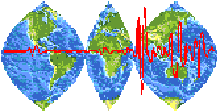 |
|
| |
|
As of January 2006 the RMS program has changed to the Risk and Vulnerability program. RMS' Advanced Modeling activity is now within the Integrated Modeling Environment project.
The RMS Program is focusing on the risks of natural disasters, especially the economic impacts of climate-related disasters in developing and transition countries. This means addressing the institutional and methodological complexities of risk management. RMS is developing participatory methods that combine computer models with stakeholder processes that recognize value differences and concerns about fairness in sharing risk burdens. A challenge is developing models for robust solutions to catastrophic risk and other complex problems, taking account of large temporal/spatial scales, heterogeneities, endogenous uncertainties, interdependencies, and non-linear interactions that may lead to abrupt changes with catastrophic consequences. Another challenge is to meet IIASAís growing needs for tailored modeling support for problems characterized by complex relations, huge amounts of data, and the demand for diversified methods of problem analysis by interdisciplinary teams.
RMSís research builds on important accomplishments in all three of its on-going projects:
- The Extreme Events and Socio-economic Vulnerability project has developed a software tool (CATSIM) that combines advanced methodologies for assessing the socio-economic dimensions of disaster risks and reducing the financial vulnerability of disaster-prone, developing countries. RMS staff is planning policy workshops in developing countries that will make use of this tool in assisting policy makers with risk-reduction and risk-transfer strategies.
- The Governance and Fairness project has successfully carried out a model-based citizen-participatory process for designing a public-private flood insurance system for Hungary, with a focus on the Upper Tisza river basin. The concepts leading to the success of this process will be extended to Chinaís Dongting Lake area and Japanís ToNakai region.
- The Advanced Modeling Methods and Tools project continues to develop novel approaches to model generators, handling huge amounts of data, and optimization-based solvers for comprehensive model analyses. An important innovation for RMSís risk problems has been a stochastic modeling approach that combines reduced spatial catastrophe generators with adaptive Monte Carlo optimization. Currently the project is developing a structured web-based modeling environment to integrate human expertise with modeling resources.
Responsible for this page: Karolina Werner
Last updated:
24 Feb 2011
Phone: (+43 2236) 807 0
Copyright © 2009-2011 IIASA